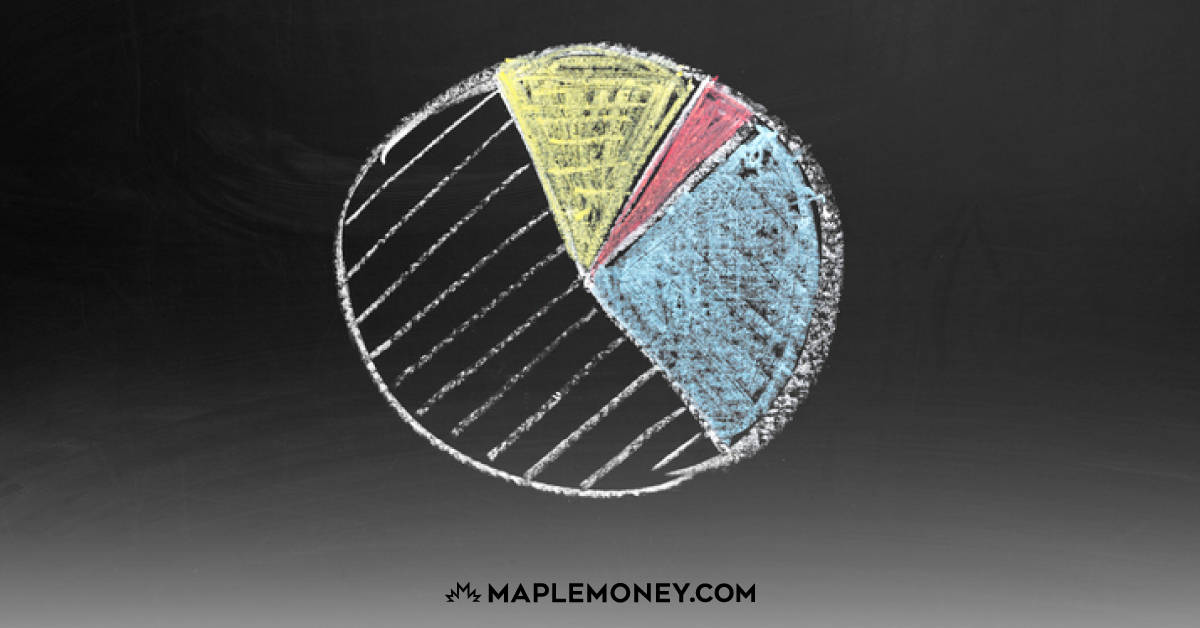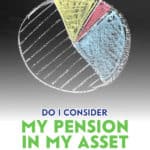Do I Consider My Pension in My Asset Allocation?

I’m a big fan of the theory that basic asset allocation is likely to have a larger impact on the real returns of most investors’ portfolios than how good they are at picking specific stocks. Numerous academic studies back up that assessment, and given the average person’s inability to rationally think about stock or bond market returns, this makes a lot of common sense as well.
In that vein of thought I was thinking about my overall asset allocation last week. At this point is my life as a relatively young person, I have almost 100% exposure to stocks in my portfolio (which admittedly isn’t very large) due to the fact I won’t be touching my investments for several decades. Within retirement investments I currently have substantial portions of Canadian, American, and international equities (all done through low-cost, efficient ETFs). I plan on following a very straight forward couch-potato strategy and re-balancing amongst those equities, and when I get a little closer to retirement, re-balancing along asset class lines as well.
The interesting consideration that I hadn’t built into my investment model was what my pension assets are invested in. Now I’m not sure I even need to worry about this too much for two main reasons:
1) I have no control over my pension (as frustrating as this is, it’s interesting that it is the envy of most Canadians). A rather large amount gets deducted from my paycheque every month and gets automatically thrown into a large pool of money (along with my employer’s – the government’s – contribution) that is handled by a third party. I have no input into how much gets taken off or what it is invested into.
2) Regardless of what our pension fund is invested in, there are contractual obligations to provide me with a certain periodical amount once specific conditions are met (like most pension agreements), so to one way of thinking it doesn’t really matter what the third party invests the money in. I have no faith in CPP or OAS to be there for me when I retire, but I’m fairly certain my teacher’s pension will still be there, even if it is modified a bit (for example maybe the cost of living adjustment might be less generous).
Since I have no control, and the investments don’t appear to matter a whole lot, I’m not sure I even really need to worry about what my pension fund is invested in. However, there might be some merit in slightly overweighting my personal retirement savings in US and international equities since I’m already fairly heavily invested in Canadian companies through the CPP (another fund I pay into every month) and my teacher’s pension.
What do you all think? Is there a systemic risk to me being overweight in Canadian equities as far as my overall financial picture is concerned? Or does the pension-related investments not really matter because of the points noted above?


Comments
I do have risk level options in my work pension plan and I have adopted for a fairly low risk option to balance the riskier indiviual stocks I hold in my TFSA.
I only contribute up to the very small match so this isn’t a large part of my budget.
My bank RRSP mutual fund is fairly conservative as well. I am in my late 40s and can’t be too risky with my investments.
Moshe Milevsky wrote the book, Are You A Stock or a Bond? I believe you’d be considered a bond and therefore should be justified in being overweight in equities in your individual portfolio.
http://www.thestar.com/business/personal_finance/2010/10/08/six_reasons_why_i_wont_buy_bonds.html
I’ve been retired for a little over one year now. I’ve been a DIY investor since I dropped my advisor in 2008. My investing style is predominantly dividend growth and it has served me well. Personally, I consider my company pension & CPP to be the fixed income portion of my retirement income so I am almost 100% in equities.
I consider my pension and Social Security as my fixed income portion of my asset allocation. I think you have to or your allocation will be out of balance.
Good post Kyle.
I didn’t always see my portfolio this way, but I do (the same as you now); I also consider my pension part of my portfolio.
The longer my employer keeps me, the longer (and larger) the bond component of my portfolio becomes. I recently wrote about that:
http://www.myownadvisor.ca/2012/12/got-a-defined-benefit-pension-plan-consider-yourself-lucky-then-consider-it-a-big-bond/
So, I too, focus on equities in my personal portfolio outside of work.
I have no faith in CPP or OAS either 🙂
Mark
Your CPP, OAS and your employer pension are fixed income by definition. Some or all of them are indexed at least partially.
You are using the equity market to supplement your savings and you should think of the various allocations (Canadian, US, and world) as independent of your pensions. If you start accounting for the fixed nature of the pensions, you run the risk of neutralizing gains on either side.
Like MyOwnAdvisor and others I consider the pension to be a “super real return bond” in that it is inflation indexed and guaranteed.
I also consider CPP and OAS in this way in apportioning risk through asset allocation.
Something to consider however:
The commuted value of a pension in net worth calculations should be computed on an after tax basis as if the pension is collapsed in lump sum and not transferred to a LIF or other registered vehicle it is fully taxed as income in the year of collapse.
I’m surprised how many people who responded have defined benefit pensions. I don’t personally know anyone who has one of those. For those of us with DC pensions, you certainly can’t consider it “fixed income” since there’s no guarantee you’ll get anything when you retire (if the market tanks, you could lose most of your 30 years of pension contributions the day before you retire!). And with DC you choose what you invest in, within the (poor) choices you’re offered.
I wouldn’t count on indexing of any pension except the partial indexing of CPP being there when you need it. I’ve seen it stripped away from many older relatives post retirement when their pension funds got hit by the series of market crashes that started with the dotcom collapse. If a fund is basically bankrupt it doesn’t have to honour anything.
Hey Kyle,
I agree with Robb and Moshe Mievsky’s book “Are You a Stock or a Bond?” that your DB pension should be considered a bond holding because it is a guaranteed payout.
In your case, I assume your pension assets are probably far larger than your personal assets, which would mean that you may only be 20% or 25% in equities.
Considering that you are young and a relatively aggressive investor, does this allocation make sense for you?
Ed
I think the safest strategy – is do not count on it all together!
Be completely independent. This could allow to minimize risk of being an Enron widow.
I am fascinated and also thinking about what you are currently talking about the following.
My pension while a major investment for me, in terms of the amount I put into it, is most assuredly an asset to me as well. If I put that money into an RRSP would it not be an asset? Yes, it would, so yes my pension is an asset.
How much is this asset worth is the question, as it does have medical & dental benefits (which will have to be paid for, but is nice to have). If I pass on early, my wife gets benefits (as does my son, who is disabled). How is that value calculated?